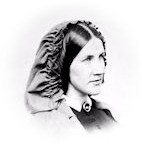Written from the Sea islands of South Carolina.
St. Helena’s, August 26, 1862.
It is too bad that I have had lately so little time to write. But you may guess how hard it is by the sketch of a day that I will give you.
I get up about six and hurry down so as to have breakfast by seven for Captain Hooper to set out to the ferry for Beaufort. After that I generally have three or four patients, feed my birds, and am ready by nine for driving out to see my patients on five plantations — only one plantation or two a day, though. The roads are horrible and the horses ditto, so I have a weary time getting along, but it is enlivened by a little reading aloud, Ellen and I taking turns at driving and reading. We come hurrying home by two o’clock or a little before, using mental force enough to propel the whole concern — horse, carriage, and ourselves. We snatch a lunch and begin school. I have the middle class, Ellen the oldest and youngest. At four, school is out for the children. Ellen then takes the adults while I go doctoring down to the “nigger houses,” or street of cabins. As soon as I get home (generally with six or seven little negro girls and boys — or babies — tugging to my dress and saying, “my missus” — the little things that can scarcely speak each having chosen a favorite “missus”), I run up the flag and the men come for their guns. This is about six o’clock. They drill an hour or so, and then I take the guns again. They are kept in the room next to mine, under lock and key. Then I dress for dinner, and order it, or see to its coming upon the table in some presentable shape. Dinner takes till eight or half-past, or even, if Captain H. is detained, till half-past nine. I generally have several patients to attend to in the evening, and the rest of the time Ellen and I are kept busy folding papers for the medicines. We go upstairs so as to begin to undress at ten, and we are so sleepy that I often get sound asleep just as soon as my head touches the pillow. We both keep hearty and strong. The negroes say I am strong “too much.” . . .
By the vessel that has come I expect letters from all of you. It has been so long since I heard, that I am quite lonely. I dread any news from the army. General Saxton is talking of making his headquarters on this island, but alas, not here! He has to take his staff and stores with him, and we could not have them here very well. We have good, gentle, conscientious Mr. Soule here, and as he is General Superintendent of these two islands, that is something. I hope we shall not lose Mr. Hooper, who is the best fellow that ever lived. I have great discussions with him upon anti-slavery.
Nelly Winsor has not got back yet. We do very well — better than I expected — without her, but I shall be very glad to have her return. I am not at all sorry that I did not accept the superintendency of the place, for it would be too much care of a kind that I do not like — accounts, pay-rolls, rations to be measured exactly, complaints to hear and satisfy, authority to exert. I like my position as volunteer and would not willingly give it up.
The mosquitoes are so horrible that we cannot, generally, write at all in the evening. Even Ellen has given up writing then, entirely, except on such a night as this, when it is an easterly cold storm, and the pests are all blown away. We tried getting under the mosquito net and writing, but having twice set it on fire we are afraid to venture, and have positively abandoned all attempts to use a candle at night for reading or writing.
Wednesday.
I keep hoping for more time and now I think I shall take it. The “fever month” is over, and the fever proves all a scarecrow. Common chills and fever have now begun, but of a very easily managed kind. I have had good luck with my patients so far, and my fame is tremendous. One woman died, though, that might have been saved, I think.









